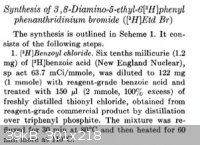andre178
Hazard to Self
 
Posts: 61
Registered: 11-12-2009
Location: San Diego, CA
Member Is Offline
Mood: pacified
|
|
why heat after reflux
I have a harder time deciphering older publications, and I don't want to mess up the reaction so I have a syntax problem in the below step of
synthesis.

I am performing a practice run using non-tritiated benzoic acid. The step itself is simple, adding thionyl chloride to benzoic acid. Reflux for 30
minutes / 80 deg Celsius.
What I don't understand is the 2nd part, heat it at 110 deg for 60 more minutes. Do I take off the water condenser once I finish refluxing and let
some of the thionyl chloride evaporate?
The reflux 80 degrees should be the liquid or the vapor (like in sep distillation)? Since I'm working with such small amounts (150 microliters) how
can I find the correct temperature?
I hope these questions are not too stupid.
|
|
|
starch
Harmless

Posts: 33
Registered: 13-3-2010
Member Is Offline
Mood: No Mood
|
|
dude read it, it makes perfect sence 
reflux it for 30 at 80c, then turn the temp up to 110c for a further 60 mins.
yes still in reflux aparatus
|
|
|
matei
Hazard to Others
  
Posts: 205
Registered: 16-9-2006
Member Is Offline
Mood: No Mood
|
|
In the second step you have to replace the reflux condenser with a distillation head and distill off the excess of thionyl chloride. This is the
standard procedure for making acid chlorides.
EDIT: I assumed you were going to scale up that procedure. If you use just 0.15 mL of thionyl chloride you can just evaporate the excess.
[Edited on 14-2-2011 by matei]
|
|
|
andre178
Hazard to Self
 
Posts: 61
Registered: 11-12-2009
Location: San Diego, CA
Member Is Offline
Mood: pacified
|
|
thanks matei
|
|
|
unionised
International Hazard
    
Posts: 5128
Registered: 1-11-2003
Location: UK
Member Is Offline
Mood: No Mood
|
|
If you are going to do that with radiolabelled material it is probably better to use a condenser and catch the by-products I know that shouldn't have
any activity, but I'd not want to bet on it. Also, I think that one of the by-product will be tritiated HCl (TCl?)which would need proper disposal.
|
|
|